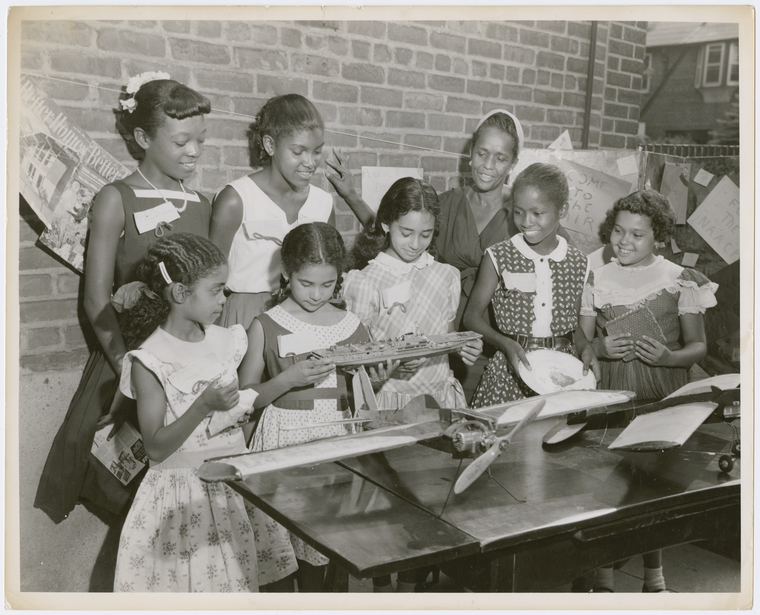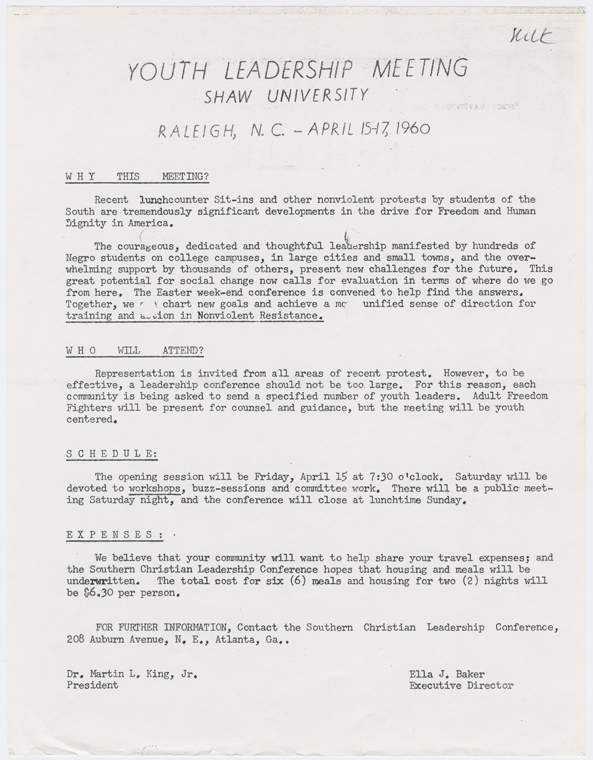A Look at the Ella Baker Initiative & Intergenerational Activism

Zenzele Johnson is the manager of The Ella Baker Initiative at the Schomburg Center. Its mission is to inspire civic engagement in the tradition of its namesake and other Black women who understood the power of learning and literacy to empower civil and voting rights advocates.
Ms. Baker, whose skills as an organizer made her the go-to person for leaders such as A. Philip Randolph and Martin Luther King, Jr., believed that knowledge of Black history was the foundation of grassroots collective action.
The Schomburg Center holds the Ella Baker Papers, which provide a look at her life as a civil and women’s rights activist.
Below, Johnson discusses the initiative and the family tradition she discovered she continued during the 2020 election. [Her comments have been lightly edited.]

What will you be doing? What are some of the programs in the works?
As a steward of this initiative, my intention is to create programming that spans across generations and that disrupts the history we've been taught regarding Black women’s impact on civic action in this country. It centralizes Black women’s role and celebrates them in the process.
It is my pleasure to honor those who have laid the foundation and continue the conversation in community. Currently, I am conducting research to create a LibGuide featuring Ms. Baker as well as creating digital resources for youth, educators, and families. In addition, there will be more virtual programming coming up. I can’t say much right now but I’m excited for what’s to come!
Tell us about the intergenerational conversation you hosted, Lifting As we Climb: Black Women’s Battle at the Ballot Box, with author Evette Dionne and recent Teen Curators alumni.
We had our inaugural event on October 28 and it was wonderful! It was extremely important to have two alumni from the Teen Curators program, Jillian Peprah-Frimpong and Maya Scriven, be in conversation with the author, Evette Dionne for her book, Lifting As we Climb: Black Women’s Battle to the Ballot Box. Not only because they were first time voters, but because they were curious about Black women’s long-term tradition in civic engagement.
Dionne’s book is a great entry point for our young people interested in the history of civic engagement in this country. The story is incomplete if all we are hearing about are suffragists, Elizabeth Cady Stanton and Susan B. Anthony. This event was about amplifying the names of the women who literally placed themselves in danger for Black Indigeous People of Color to participate in the matters of our lives, to choose a vote of survival.
This was for Josephine St. Pierre Ruffin, Ida B. Wells Barnett, Mary Church Terrell, Mary McLeod Bethune, Fannie Lou Hamer, Amelia Boynton Robinson, Charlotta Bass, Shirley Chisholm, Ella Baker, and so many more. With us now having the first Black woman elected as Vice President, Kamala Harris, we celebrate and yet the struggle continues and, therefore, the work.
What do you want people to take away after learning about Ms. Baker?
Her tenacious, immense drive, and simply how she knew herself, her gifts and used them to her best ability. I don’t want her legacy to just be aligned with the many male leaders she helped foster—Dr. Martin Luther King, Jr., Julian Bond, Stokley Carmichael— but Ms. Baker served as an integral catalyst for change within the freedom movement. She was one of the most important leaders who understood how to centralize the lived experiences of those traditionally on the margins first and foremost. She believed in getting at the root and expounding from there. She received pushback many times for her radical framework and yet she persisted.
As you were researching Ms. Baker and setting up this project, what did you learn about her that surprised you?
I’ve learned so much and continue to. Her biographer Barbara Ransby (Ella Baker and the Black Freedom Movement: A Radical Vision) has done an amazing job shaping how her origins, interior life, and worldview shaped the scope of her larger life , which informs her impact today.
Ms. Baker says in the documentary on her work, Fundi: The Story of Ella Baker, “My mother wanted me to be a teacher but I was determined to be free to express my opinion.”
Her voice is just so candid and powerful. Before conducting research for this initiative, I hadn’t heard her voice before. She could care less about the applause —her mind was on delivering the message, doing the work.

Reading some of her papers such as a 1960 flyer bearing her name and Martin Luther King Jr.’s in the Schomburg Center’s digital collections and correspondence has been a delight.
How has Ms. Baker's life and legacy impacted you?
She and her life’s work has helped me understand how the collective can be radical, which can lead to freedom and, ultimately, liberation.
While I think that is something that we know, to read about her life and see how she was very much an orchestrator of change in so many ways in creating the frameworks for so many roles she occupied at the 135th Street Library (now part of the Schomburg Center complex), National Association for the Advancement of Colored People (NAACP), Southern Christian Leadership Conference (SCLC), Student Nonviolent Coordinating Committee (SNCC), and the YWCA is inspiring.
I believe that took such wisdom and foresight to conduct— to make sure all the players within the collective have what they need to mobilize is something many take for granted. As an educator, I’m inspired by the way she worked with youth and aim to follow her lead.
Ransby wrote about Ms. Baker as an educator, “She sought to instill in them a sense of their own power to think critically, analyze events, and articulate their opinions and beliefs.” To this day, this is seen as a radical effort that allows youth to voice their opinions and make decisions. The youth have so much to say. It is up to us to listen and facilitate guiding in honing their voices.
The biggest point I’ve taken away from learning about her life is that she knew herself, her role within organizations and ultimately when it was time to leave and answer or discover another call within her organizing work. Ms. Baker had a vision that was vast and at the time in which she was organizing it may have seemed too big, too radical, too much and when she outgrew her position, she resigned gracefully to answer the call elsewhere. She was called to do this work and while she believed in organizations, she would not let organizations limit her vision of freedom.
Why did you become a poll worker during the 2020 election?
The Board of Elections expressed that they needed more poll workers due to early voting and additional polling sites being opened. Previously, when going to the polls it was always clear to me that retirees mostly served the polls. With COVID-19 on the rise, they are a part of a vulnerable demographic. I thought this would be a good time to provide service to my community. Being able to support those who choose to vote is extremely important.
I served as a Line Management and Accessibility Clerk, meaning that I was one of the first people one would see when entering the polls. I worked with so many amazing folk who had been doing this since they were in their late teens and they showed me the ropes. It was an honor to greet people and create an atmosphere that was welcoming especially for first-time voters.
Recently I learned that my grandmother, Helen Lucille, worked the election polls for about ten years in Ohio. So, it felt as if I was carrying on a tradition—one that I hope to continue in the future.
The Ella Baker Initiative is funded through a grant from Pivotal Ventures. The project is part of the celebration of the 100th anniversary of the 19th Amendment.
Read E-Books with SimplyE
 With your library card, it's easier than ever to choose from more than 300,000 e-books on SimplyE, The New York Public Library's free e-reader app. Gain access to digital resources for all ages, including e-books, audiobooks, databases, and more.
With your library card, it's easier than ever to choose from more than 300,000 e-books on SimplyE, The New York Public Library's free e-reader app. Gain access to digital resources for all ages, including e-books, audiobooks, databases, and more.
If you don’t have an NYPL library card, New York State residents can apply for a digital card online or through SimplyE (available on the App Store or Google Play).
Need more help? Read our guide to using SimplyE.